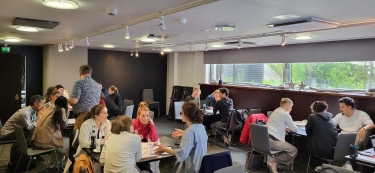Circular bioeconomy offers game-changing solutions

- Leading representatives from science, investors and industry today met with HRH The Prince of Wales to discuss how to accelerate the transition to a circular bioeconomy to enable a carbon-neutral, renewable and inclusive economy that prospers in harmony with nature.
The need to react to the COVID-19 crisis is a unique opportunity to transform our economy and put forward the change that our society needs to create a sustainable and desirable future.
A Circular Bioeconomy Roundtable convened by HRH The Prince of Wales today discussed how this should be done: not just by designing recovery packages, but by transformative action to trigger mission-oriented innovation, attract investments and rethink business models and markets. Leading figures from science, the investment community and industry discussed how a circular bioeconomy offers game-changing solutions and is a crucial concept to move towards a carbon-neutral, renewable and inclusive economy that prospers in harmony with nature.
A circular bioeconomy uses renewable natural capital to holistically transform and manage our land, food, health and industrial systems with the goal of achieving sustainable wellbeing. The latest scientific insights and breakthrough technologies have been described in a new 10-Point Action Plan to catalyse a circular bioeconomy of wellbeing, coordinated by European Forest Institute Director Marc Palahí.
“The Action Plan is our response to HRH The Prince of Wales’ call to invest in nature as the true engine for our economy”, said Marc Palahí, who moderated the roundtable. “We brought together over 25 authors from across scientific disciplines to consider what global, holistic and transformative action we can take to put the world on a sustainable path.”
The Action Plan will serve as the guiding document for a new Circular Bioeconomy Alliance, to be established by His Royal Highness The Prince of Wales under his Sustainable Markets Initiative. EFI will play a key role in the newly established Alliance by facilitating the provision of knowledge-informed support, as well as providing a networking platform to connect the dots between investors, companies, governmental and non-governmental organizations to advance the circular bioeconomy globally.
The President of the Finnish Innovation Fund Sitra, Jyrki Katainen, who participated in the roundtable emphasized “This is a great opportunity to advance the circular economy and an important platform for a dialogue between investors, business and science, alongside the World Circular Economy Forum. Sitra is very happy to partner with EFI and contribute to a forward looking and informed dialogue.”
More information
A 10 Point Action Plan to catalyse a circular bioeconomy of wellbeing
A circular bioeconomy of wellbeing (figure)
The Circular Bioeconomy Roundtable took place within the framework of HRH’s Sustainable Markets Initiative, launched at the World Economic Forum’s annual meeting in Davos in January 2020. Since the COVID crisis, HRH has been working with global leaders and the World Economic Forum to determine how Sustainable Markets can serve as a catalyst to ‘Build Back Better’ and leapfrog our ambitions for a more sustainable future. The Circular Bioeconomy Roundtable is the first initiative of the ‘Great Reset’, launched on 3 June.
The Sustainable Markets Initiative consists of key high-level corporate, national and international leaders and explores creative solutions, models sustainable leadership and champions sustainable markets at a global scale. EFI Director Marc Palahí was appointed to the Sustainable Markets Expert Network in February 2020.
For further information please contact:
Marc Palahí, EFI Director (marc.palahi @ efi.int) +358 10 773 4342
Rach Colling, Head of Communications, EFI (rach.colling @ efi.int) +358 50 5956717
About EFI
The European Forest Institute (EFI) is an independent international science organization which generates, connects and shares knowledge at the interface between science and policy. EFI has 29 member countries who have ratified the Convention, and c.120 member organizations in 38 countries, working in diverse research fields.
Photo: ©TSUNG-LIN WU - stock.adobe.com


